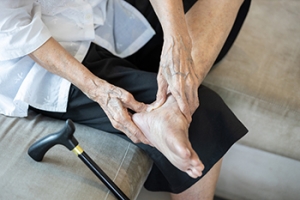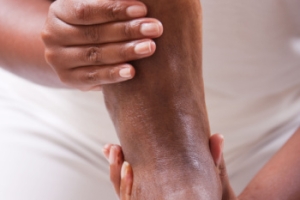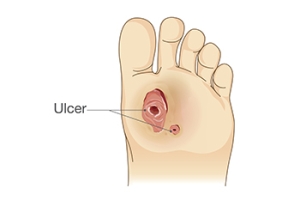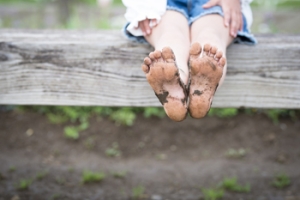Connect With Us

Addressing Challenges in Foot Care Among Older Adults
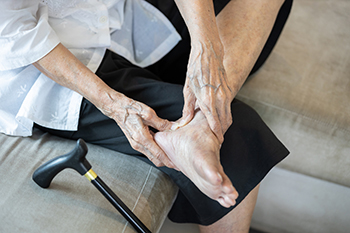
As individuals age, the importance of proper foot care becomes increasingly evident. However, older people often face unique challenges in maintaining good foot health. Reduced mobility and flexibility can make it difficult for seniors to attend to their feet regularly. Conditions such as arthritis can further impede their ability to perform basic foot care tasks like trimming nails or inspecting for cuts and sores. Additionally, age-related changes in skin and circulation increase the risk of developing foot problems such as corns, calluses, and infections. Furthermore, chronic health conditions like diabetes can exacerbate these issues, as diabetic neuropathy may diminish sensation in the feet, making it harder to feel injuries or wounds. Lack of awareness about the importance of foot care and its relationship to overall health also contributes to neglect in this area. If you or a loved one is elderly, it is suggested that an appointment with a podiatrist is scheduled who can provide you with effective foot care tips and treatment.
If you need your feet checked, contact Robert Hutchison, DPM, FACFAS of Lower Keys Foot & Ankle Surgery. Our doctor will attend to all of your foot and ankle needs and provide you with quality treatment.
Geriatrics and Podiatry
When people age, some common issues that may occur are bone density loss, dry skin, poor circulation, and rough brittle nails. These issues may also affect your foot health if the necessary steps are not taken to alleviate the problems.
It is important to take care of your feet because feet that are injured or diseased can affect your overall health. Having painful feet hinders your ability to do daily activities or may decrease your willingness to do the things that you need to do.
Visiting Your Geriatrician
As we age, health problems become more likely, so it is essential to visit your doctor for check-ups to ensure that you are doing the best you can to take care of your health. It is recommended to check your feet frequently for any possible cuts, bruises, swelling, corns or any other irregularities.
Taking Care of Elderly Feet
Cracked or dry feet can be treated by applying moisturizer often. It is also important not to wear old socks because the older the sock is, the higher the possibility there will be that there is bacteria there. Wear fresh socks and make sure they fit properly.
Proper foot health means that you can have a more active lifestyle and you will not be bogged down by pain. Foot health also leads to good circulation, which is paramount for overall health.
If you have any questions, please feel free to contact our office located in Key West, FL . We offer the newest diagnostic tools and technology to treat your foot and ankle needs.
Geriatrics and Podiatry
Bone density loss, dry skin, poor circulation, and rough and brittle nails are some of the common problems that can occur as people age. The effect that these problems has on foot health should be of particular concern in comprehensive geriatric care.
Feet that are diseased or injured have a negative effect on overall health and safety. Painful feet limit a person’s willingness and ability to stay active. Poor foot health can also cause gait change, which can lead to falls and accidents. Even though recovery time from health problems naturally slows as we age, many foot problems can be avoided altogether with regular prophylactic care.
Feet should be thoroughly washed in warm water daily. Care must be taken to dry the feet well, making sure to dry between and under the toes. Any left-over moisture can cause problems like foot fungus. After cleaning feet carefully check for problems such as cracked skin, bruises, swelling, cuts, corns, or other irregularities.
Examine toenails for ingrown, jagged, or split nails. Long toenails should be cut straight across. Never cut toenails at an angle or down the side as this may lead to ingrown nails.
Cracked and dry feet should be treated once or twice a day with a non-greasy moisturizer. Rub the moisturizer into the skin and allow it to dry before putting on socks and shoes. Sweaty feet can be dusted with a small amount of talcum powder. Avoid putting talcum directly into shoes as this may make feet slip within the shoe and cause a serious fall.
Wear clean dry socks each day. Not only do clean socks feel better on the feet, but socks worn for longer periods may harbor disease and odor-causing bacteria. Socks should not be tight around the top as they can leave marks on the leg. Socks that are too small can bring about bruising caused by pressure against the toes.
Wear comfortable and well-fitting shoes. If possible, consult a professional footwear specialist when purchasing shoes. Do not walk around barefoot as this exposes the feet to possible injury and bacteria.
Good foot health allows a more active lifestyle, which improves blood flow. Good circulation aids in recovery from injury or illness. It is also important for maintaining overall health.
Serious health problems can manifest themselves as symptoms in the feet. The elderly should seek professional help from a podiatrist if experiencing foot problems like tingling, numbness, pain, infection, or a sore that does not heal. Taking care of these problems right away can prevent the development of severe cases.
Foot Health and General Wellness
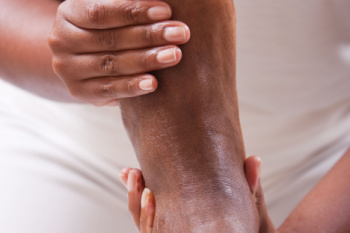
Good foot health is integral to overall well-being. Podiatrists play a vital role in maintaining both foot and general health. These doctors diagnose and treat various foot conditions, such as bunions, plantar fasciitis, and ingrown toenails, preventing further complications. Podiatrists also address systemic issues like diabetes and arthritis, which often manifest in the feet. By providing custom orthotics, they improve biomechanical alignment, reducing pain and enhancing mobility. Regular foot examinations by a podiatrist can detect early signs of systemic diseases, facilitating timely intervention. Additionally, podiatrists offer education on foot care practices and footwear selection, promoting preventive measures for optimal foot health. If you have problems or concerns about your foot health, it is suggested that you schedule an appointment with a podiatrist for a consultation and any treatment that is deemed necessary.
Everyday foot care is very important to prevent infection and other foot ailments. If you need your feet checked, contact Robert Hutchison, DPM, FACFAS from Lower Keys Foot & Ankle Surgery. Our doctor can provide the care you need to keep you pain-free and on your feet.
Everyday Foot Care
Often, people take care of their bodies, face and hair more so than they do for their feet. But the feet are a very important aspect of our bodies, and one that we should pay more attention to. Without our feet, we would not be able to perform most daily tasks.
It is best to check your feet regularly to make sure there are no new bruises or cuts that you may not have noticed before. For dry feet, moisturizer can easily be a remedy and can be applied as often as necessary to the affected areas. Wearing shoes that fit well can also help you maintain good foot health, as well as making it easier to walk and do daily activities without the stress or pain of ill-fitting shoes, high heels, or even flip flops. Wearing clean socks with closed shoes is important to ensure that sweat and bacteria do not accumulate within the shoe. Clean socks help to prevent Athlete’s foot, fungi problems, bad odors, and can absorb sweat.
If you have any questions please feel free to contact our office located in Key West, FL . We offer the newest diagnostic and treatment technologies for all your foot and ankle needs.
Every Day Foot Care
Our feet are important in our everyday lives. The problem is that we tend to neglect them. When this becomes a habit, it can cause significant trouble. Ignoring foot problems can mean pain, limited mobility, and expensive doctor's visits. On the other hand, if feet are cared for and looked after regularly, they will perform without pain or complication.
Routine hygiene is the most basic way to care for the feet. Wash and dry them thoroughly daily. Remember to get between the toes and keep the toenails trimmed and short. If the feet feel dry or there are signs of dryness or cracking, use a moisturizer designed for the feet.
When using moisturizer on the feet, try to avoid applying between the toes. If cream or lotion sits too long, they can cause fungal and bacterial growth. When moisturizer is used between the toes, it can also cause the skin to soften too much.
Shoes are also an important aspect of foot care. When one is picking out shoes, make sure they are the correct size. Shoes need to be snug, but not too tight. On the other hand, if shoes are too loose they can cause foot problems as well. It is highly recommended that shopping for new shoes be done later in the day. The reason for this is that the feet will have settled and swelled to their full size by then. To keep your feet at their most healthy, avoid wearing high heels or flip flops too often. Instead, choose shoes that are good for your feet. Good shoes pad the soles of your feet and support the arches and ankles.
Socks should also be worn daily with closed-toe shoes. They may feel hot during the summer months, but they absorb sweat and moisture off the feet. Without socks, the build-up of sweat in a closed-toe shoe can cause fungal problems and athlete's foot.
The best thing to remember in every day foot care is that shoes do make a difference. If you spend a lot of time on your feet, make sure that your shoes show no signs of wear. Shoes should offer ample support for the arches and the overall foot. Additionally, try to make foot cleaning and maintenance a daily habit. If you keep these things in mind, your feet will stay healthy and safe.
Definition and Symptoms of a Diabetic Foot Wound
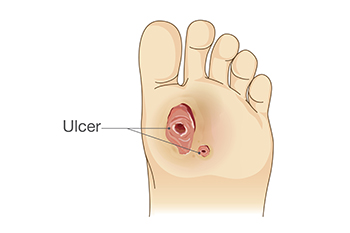
A diabetic foot wound refers to an open sore or ulcer that develops on the foot of individuals with diabetes, typically due to a combination of factors including neuropathy, poor circulation, and impaired wound healing. Neuropathy, a common complication of diabetes, causes nerve damage that diminishes sensation in the feet, making individuals less aware of injuries or pressure points that can lead to wounds. Poor circulation, another consequence of diabetes, reduces blood flow to the feet, hindering the delivery of oxygen and nutrients necessary for wound healing. These factors, coupled with compromised immune function, increase the risk of infections and slow the healing process. Symptoms of diabetic foot wounds may include redness, swelling, warmth, drainage, and foul odor. Recognizing these signs is crucial for prompt intervention and prevention of complications such as infections and amputations. If you have diabetes and have developed a foot wound, it is strongly suggested that you are under the care of a podiatrist who can provide you with the proper wound care.
Wound care is an important part in dealing with diabetes. If you have diabetes and a foot wound or would like more information about wound care for diabetics, consult with Robert Hutchison, DPM, FACFAS from Lower Keys Foot & Ankle Surgery. Our doctor will assess your condition and provide you with quality foot and ankle treatment.
What Is Wound Care?
Wound care is the practice of taking proper care of a wound. This can range from the smallest to the largest of wounds. While everyone can benefit from proper wound care, it is much more important for diabetics. Diabetics often suffer from poor blood circulation which causes wounds to heal much slower than they would in a non-diabetic.
What Is the Importance of Wound Care?
While it may not seem apparent with small ulcers on the foot, for diabetics, any size ulcer can become infected. Diabetics often also suffer from neuropathy, or nerve loss. This means they might not even feel when they have an ulcer on their foot. If the wound becomes severely infected, amputation may be necessary. Therefore, it is of the upmost importance to properly care for any and all foot wounds.
How to Care for Wounds
The best way to care for foot wounds is to prevent them. For diabetics, this means daily inspections of the feet for any signs of abnormalities or ulcers. It is also recommended to see a podiatrist several times a year for a foot inspection. If you do have an ulcer, run the wound under water to clear dirt from the wound; then apply antibiotic ointment to the wound and cover with a bandage. Bandages should be changed daily and keeping pressure off the wound is smart. It is advised to see a podiatrist, who can keep an eye on it.
If you have any questions, please feel free to contact our office located in Key West, FL . We offer the newest diagnostic and treatment technologies for all your foot care needs.
Wound Care
Diabetics must be wary of all wounds, regardless of depth or size. Diabetes, a chronic disease in which the body cannot properly use glucose the way it normally would, causes various complications that make wounds difficult to heal. Nerve damage or neuropathy will cause diabetics to have trouble feeling the pain of a blister or cut until the condition has significantly worsened or become infected. A diabetic’s weakened immune system can make even the most minor of wounds easily susceptible to infection. Diabetics are also more prone to developing narrow, clogged arteries, and are therefore more likely to develop wounds.
Wounds should be taken care of immediately after discovery, as even the smallest of wounds can become infected if enough bacteria build up within the wound. To remove dirt, wounds should be first rinsed under running water only. Soap, hydrogen peroxide, or iodine can irritate the injury and should be avoided. To prevent infection, apply antibiotic ointment to the wound and cover it with a bandage. The bandage should be changed daily. The skin around the wound may be cleaned with soap.
To prevent further exacerbation, see a doctor—especially if you have diabetes. Minor skin conditions can become larger problems if not properly inspected. As the wound heals, make sure to avoid applying pressure to the affected area.
Sports Injuries in Children That Can Affect the Feet

Sports activities are a way people express their love for moving, playing, and competing. Many kids and teens take part in sports, but because sports involve a lot of physical activity injuries can happen. Approximately 30 to 40 percent of all injuries in kids and teenagers occur during sports. However, younger kids are generally less likely to get injured than older teenagers. The kind of foot injuries kids can get depend on the sport being played. The risk also depends on how hard the child plays. Some sports, like swimming, have a lower risk of foot injury. Others, such as ball sports, have a medium risk. And some, like riding or ice skating, have a high risk. Each sport has its typical types of injuries. The lower part of the body is more likely to get injured in sports like soccer, skiing, and running. If your child has incurred a foot injury from sports or from anything else, it is suggested that you schedule an appointment with a podiatrist for a proper diagnosis and treatment
The health of a child’s feet is vital to their overall well-being. If you have any questions regarding foot health, contact Robert Hutchison, DPM, FACFAS of Lower Keys Foot & Ankle Surgery. Our doctor can provide the care you need to keep you pain-free and on your feet.
Tips for Keeping Children's Feet Healthy
- Make sure their shoes fit properly
- Look for any signs of in-toeing or out-toeing
- Check to see if they have Clubfoot (condition that affects your child’s foot and ankle, twisting the heel and toes inward) which is one of the most common nonmajor birth defects.
- Lightly cover your baby’s feet (Tight covers may keep your baby from moving their feet freely, and could prevent normal development)
- Allow your toddler to go shoeless (Shoes can be restricting for a young child’s foot)
- Cut toenails straight across to avoid ingrown toenails
- Keep your child’s foot clean and dry
- Cover cuts and scrapes. Wash any scratches with soap and water and cover them with a bandage until they’ve healed.
If you have any questions, please feel free to contact our office located in Key West, FL . We offer the newest diagnostic and treatment technologies for all your foot care needs.
